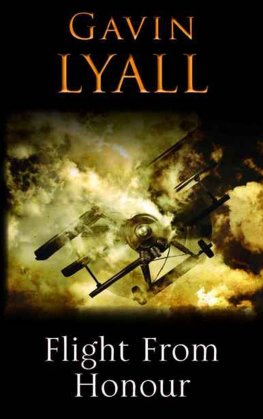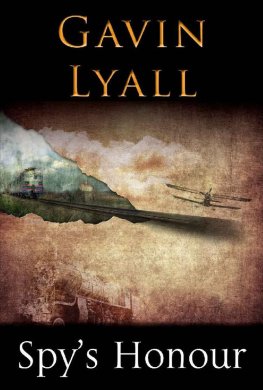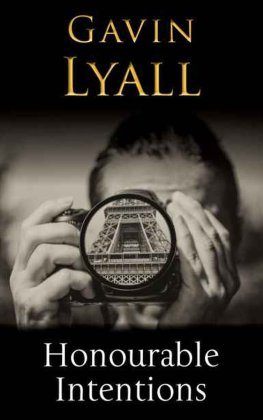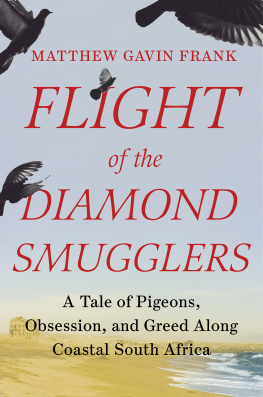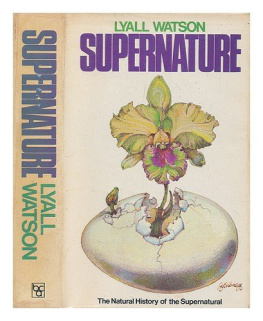Gavin Lyall - Flight From Honour
Here you can read online Gavin Lyall - Flight From Honour full text of the book (entire story) in english for free. Download pdf and epub, get meaning, cover and reviews about this ebook. year: 2013, publisher: PFD Books, genre: Detective and thriller. Description of the work, (preface) as well as reviews are available. Best literature library LitArk.com created for fans of good reading and offers a wide selection of genres:
Romance novel
Science fiction
Adventure
Detective
Science
History
Home and family
Prose
Art
Politics
Computer
Non-fiction
Religion
Business
Children
Humor
Choose a favorite category and find really read worthwhile books. Enjoy immersion in the world of imagination, feel the emotions of the characters or learn something new for yourself, make an fascinating discovery.
- Book:Flight From Honour
- Author:
- Publisher:PFD Books
- Genre:
- Year:2013
- Rating:4 / 5
- Favourites:Add to favourites
- Your mark:
- 80
- 1
- 2
- 3
- 4
- 5
Flight From Honour: summary, description and annotation
We offer to read an annotation, description, summary or preface (depends on what the author of the book "Flight From Honour" wrote himself). If you haven't found the necessary information about the book — write in the comments, we will try to find it.
Flight From Honour — read online for free the complete book (whole text) full work
Below is the text of the book, divided by pages. System saving the place of the last page read, allows you to conveniently read the book "Flight From Honour" online for free, without having to search again every time where you left off. Put a bookmark, and you can go to the page where you finished reading at any time.
Font size:
Interval:
Bookmark:
Gavin Lyall
Flight From Honour
1
The little fishing boat didnt take shape in the dawn mist until long after the creak of its oars and the irregular slap of water had reached the shore. Then it gradually grew detail and colour as it scraped its way past bigger boats into Muggias inner harbour. Any watcher might have wondered why it was back so much later than other boats in the local fleet. However, nobody was bothering to watch, since everyone in the village knew it had paused to take on a Mysterious Stranger from an Italian ship in the Gulf. But the Stranger himself was city-bred and still believed he was on a Secret Mission as he stepped on to the fish-scaled and slippery quayside.
Although he was shivering with cold and damp, he still saw the huddled village as having the charm of a stage set. And indeed, if anybody had written an opera about fishermen of the North Adriatic, he could have taken the whole inner harbour, with its boats and cluttered quays, and fitted it onto the stage of La Scala. Only the tiny castle in the background and the narrow alleys leading off in all directions, and already beflagged with damp washing, would have needed to be painted on the backdrop.
One of the two fishermen led him through an arch and into a raucous cafe in the comer of the town hall. Five centuries of Austrian rule hadnt much changed the Venetian buildings there was still a carved Lion of St Mark set into the stonework above the cafe nor the straight-nosed faces and brown hair of the inhabitants.
The Stranger was small, with dark lank hair, a thin sharp face and spectacles which he had continually to wipe clear in the steamy indoors warmth. Being Parisian, he asked for a large coffee and a cognac, which surprised the fisherman. On the other hand, the brandy he was given surprised the Stranger. Then everybody else politely didnt notice as he surreptiously paid the fisherman for the voyage and was taken out to the road that ran around the bay and the shipbuilding yards into Trieste.
The Cafe San Marco was far larger but, in contrast with the deliberate Italian dignity of other big cafes in Trieste, had a comfortable Mittel-Europa sprawl. It could have been in any one of a dozen cities of the Austrian empire: Prague, Budapest, Salzburg or Sarajevo. Indeed, in that summer of 1913, many would have said that the rule of the Viennese cafe was stronger than that of the aged Emperor in Vienna. And they would have said it in just such a place, with its darkened gilt frescoes, marble and mirrors, among the old men playing chess, students doing their homework, writers writing, artists arguing and journalists reading themselves in the newspapers on cane frames handed round by the waiters. And two men who might have called themselves middle-aged doing nothing but talk as quietly as they could in a busy cafe at mid-morning.
The one with the bony, ascetic face and deep-set eyes was a count, a Venetian title equal to a marquis from anywhere else, or so Venetian counts said. He was dressed with dignified raffishness in a wide hat, floppy maroon bow-tie and a short light cape, whilst his delicate fingers with their jewelled rings constantly fondled a silver-topped cane.
Senator Giancarlo Falcone who was using neither his rank nor his real name in Trieste was shorter but strong and bulky in comparison with the Counts apparent fragility. He had a large and hooked but very thin nose that could have looked sinister if it hadnt been set in a reassuringly meaty face with prominent dark eyes and an easy smile. His crinkled hair was now white and thinning out, and while you would remember him as well dressed and groomed, you wouldnt remember just how because it seemed impersonal. In the same way, he looked successful but not at anything that touched him deeply.
He looked at his wristwatch but all he said was: I heard that they invented these for Santos-Dumont, the aviator.
Is that why you wear one? The Counts Italian was Triestine, Falcones Piedmontese, but they had no problem understanding each other.
No. Falcone gestured at his jacket, buttoned so high that it showed only a brief triangle of shirt behind his necktie. How can I reach a proper watch under this?
You are a slave of fashion, the Count observed.
Perhaps, Falcone said comfortably.
The Count sipped at the tiny coffee cup. Small delicate things seemed right for him; you couldnt imagine him lifting a pint of beer. I regret the passing of frock coats. Does anybody wear them nowadays?
In Italy, only royalty, diplomatists and the more corrupt of my colleagues. I regret them, too. But they need skilled cutting to hang properly at the back and should not be worn by anyone who hurries. Of course, in London you still see many.
Are you going there?
Falcone nodded slowly. Probably. Brussels first, but most likely I will find what we need in London. I could be there about the middle of September do you yet know the date of the relief?
October the second.
Falcone nodded. Time enough. And your new friends they will accept such gifts from you without suspicion?
I was talking only the other day with the Commandante, preparing the ground, arousing his interest . . . Ah, I believe this is the lad now.
Falcone didnt turn, he just watched the Counts eyes watching over his shoulder. He looks young, the Count said. Now he has seen Aldos magazine and carnation. He is going across . . . he introduces himself . . . he sits down . . . Aldo is summoning a waiter; how imperiously he does it. Servants are much better at grandeur than we poor aristocrats.
Is anybody following him?
As I said, they neednt follow him in here: the waiters are all spies for the police or somebody.
Then why are we meeting here like cafe conspirators?
Because the waiters in every other respectable cafe are spies, too. You cant expect a good waiter to live on the sort of tips I give. And I am known to have been conspiring in here for twenty years: it would seem most suspicious if I were seen conspiring elsewhere. He leant back and blew a delicate cloud of smoke that was immediately swirled away by the passing rush of a waiter. Believe me, this is the only way; youve forgotten just what a small world Trieste is. But Im not being flippant about the dangers. Not only from the Austrians, but now the Slovenes.
Slovenes? Those farmers from the Carso?
A little more, in these days. Now the Slovenes are given money to develop what they call their folk arts, and are favoured in recruiting for the police. So they hope to keep us Italians in our place and the Slovenes too busy to concoct their own plots. The Austrians can find a lazy way of doing anything, even govern an empire. But sometimes it works, so I beg you, take great care, particularly when you leave Trieste.
I shall be leaving this afternoon for Venice, Falcone muttered, his unease back in full spate. Now, can we get this settled . . . ?
You can look round now. Hes busy talking to Aldo.
Falcone turned as if searching for a waiter and gave the Parisian a swift raking stare. His clothes are a disgrace. Just looking at him, youd know he crept ashore in a basket of fish.
You judge men too much by their clothes.
But the police judge men by the way they enter a country.
The boy knows nothing of our proposals, hes merely to tell us if, and when, the Poet will be . . . available. And dealing with the Poet one has to accept a little flamboyant secrecy. The Count lit a cigarette and fitted it into a long amber holder. Did you hear the charade of his fleeing Paris, the first time he went to Arcachon? All midnight meetings and smuggling his trunks from hotel to hotel. Its a wonder all Paris didnt turn out to watch.
Still looking irritated, Falcone asked: From whom was he fleeing that time? debtors or a woman?
Font size:
Interval:
Bookmark:
Similar books «Flight From Honour»
Look at similar books to Flight From Honour. We have selected literature similar in name and meaning in the hope of providing readers with more options to find new, interesting, not yet read works.
Discussion, reviews of the book Flight From Honour and just readers' own opinions. Leave your comments, write what you think about the work, its meaning or the main characters. Specify what exactly you liked and what you didn't like, and why you think so.

